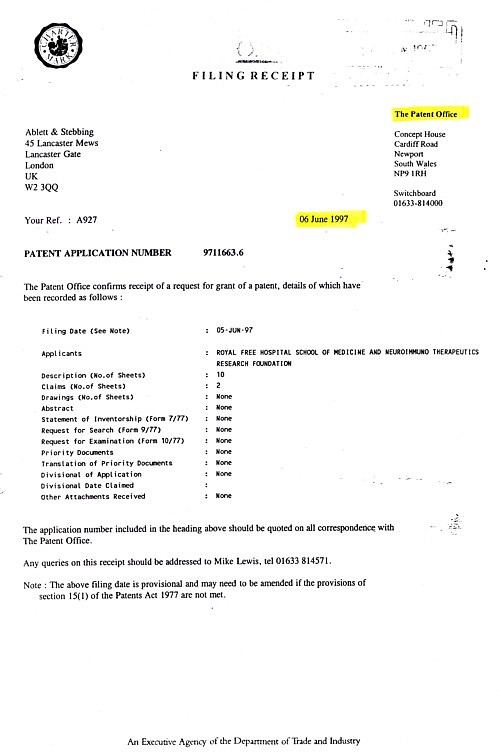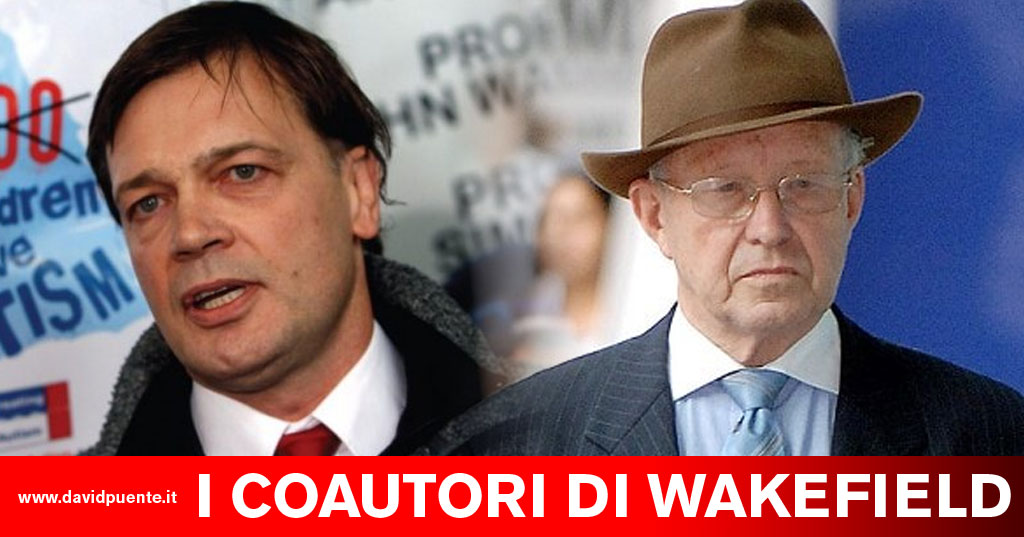Due dei coautori dello studio fraudolento di Wakefield sui vaccini vennero reintegrati nell’ordine dei medici, al contrario del ciarlatano. Come mai? Secondo alcuni sostenitori del truffatore inglese essi condividevano gran parte delle accuse. Complotto per attaccare solo Wakefield?
Valutazione
Analisi
Di recente ho assistito ad un interessante dibattito nella pagina Facebook di Enrico Mentana relativo al tema vaccini. La discussione si è sviluppata in seguito al commento del mio amico Daniele Matteo Cereda, ma uno degli interventi mi ha incuriosito parecchio:
David dovresti informarti meglio. Sapevi che il coautore dello studio è stato reintegrato? Condivideva il 90% delle accuse ( tranne quelle dei prelievi fatti “non eticamente”) ed il prof Walker-Smith era fra i leader della gastroenterologia pediatrica ( di sicuro aveva voglia di truffare il mondo)[1] ed anzi parlando così probabilmente non hai davvero letto il paper del Lancet, per cui non era stata dimostrata una correlazione ma erano necessari ulteriori studi[2]. E anzi non avrai nemmeno ascoltato la conferenza pre lancio articolo, in cui sottolineava come lui ed il suo team ritenessero fondamentali le vaccinazioni[3] E mi fermo qui, perché chi ancora rimane alla solfa ‘ Wakefield radiato ciarlatano’ mi dispiace ma è una persona superficiale[4].. adesso si spiega come mai sei fra i primi firmatari dell’anti bufala[5]
Ho suddiviso il tema in 5 punti.
[1] I due co-firmatari reintegrati e scagionati dalle accuse
Parliamo del professor Walker-Smith e del dottor Simon Harry Murch, due dei co-firmatari della pubblicazione scientifica fraudolenta del 1998 ad opera di Andrew Wakefield, uno dei più grandi truffatori della storia medica inglese.
Entrambi furono scagionati dalle accuse di cattiva condotta professionale dal GMC (General Medical Council), quanto basta ai sostenitori del ciarlatano inglese per sostenere la tesi che anche lo studio contestato fosse in qualche modo “corretto” e il loro “medico” fosse in qualche modo innocente. Non è così, siccome lo studio non venne preso in considerazione dal GMC che non parla della sentenza relativa alla frode scientifica largamente provata da Brian Deer.
Comprendo le difficoltà di chi non concepisce (o non vuole concepire) che le responsabilità dei protagonisti di un episodio possano essere diverse. Le accuse rivolte contro Wakefield e quelle contro Walker-Smith erano appunto diverse, ma soprattutto risulta dalla sentenza di assoluzione che quest’ultimo fosse vittima del primo.
Leggiamo dall’articolo del 2012 della BBC:
The disciplinary case against the doctors centred on how they conducted their work.
The judge said the GMC panel failed to address whether Prof Walker-Smith had been doing research or simply investigating symptoms to help treat children. There had been “inadequate and superficial reasoning and, in a number of instances, a wrong conclusion”, he said.
The GMC said reforms to disciplinary hearings were being considered.
Chief executive Niall Dickson added: “Today’s ruling does not however reopen the debate about the MMR vaccine and autism.
“As Mr Justice Mitting observed in his judgement, ‘There is now no respectable body of opinion which supports (Dr Wakefield’s) hypothesis, that MMR vaccine and autism/enterocolitis are causally linked’.
Le responsabilità relative a Walker-Smith riguardavano il lavoro svolto sui bambini successivamente citati nello studio di Wakefield. Riporto un’interessante sintesi:
| Against Andrew Wakefield (pdf): | Against John Walker Smith: |
| Requesting funding from the Legal Aid Board for things that were already covered by NHS (and therefore no funding was needed), used part of that money for other than the purpose it was granted. | Subjecting some of the children to investigations for research purposes (rather than clinical purpose) without ethics committee approval. Based on letters, medical records & on what was done following the project 172-96. Children: 2, 1, 3, 6, 9, 5, 12, 8, 7, 10. |
| Not disclosing to the ethics committee participation in litigation, which was, in fact, a conflict of interest. | Subjecting some children to investigations contrary to their clinical interests: 2,1,3, 9, 5, 12, 8, JS |
| For several of the children:a. Conducting clinical investigations for research purposes (rather than for clinical purposes) with no ethics committee approval. There was ethics committee approval for a specific project, with conditions, but the children in question did not meet the conditions.b. Subjecting several of the children to investigations contrary to their clinical interests.c. The panel rejects Wakefield’s claim that his role was purely administrative and finds him directly responsible. d. Not proved for most of the children (very few exceptions): not including the informed consent form – condition set after their investigation started. | Subjecting the children to research investigations not covered by any other project except 172-96 – and not meeting the conditions of that project. |
| Children 1, 5, 9 and 10 were referred for investigation of role MMR played in developmental disorders, with no gastrointestinal symptoms, in contrast to impression the paper, Wakefield’s testimony to Medical Research Council (March 23, 1998) and letter by Wakefield from 2 May 1998 gave of routine referrals to the gastroenterology department. And Wakefield knew this was inaccurate. | Children 1, 5, 9 and 10 were referred for investigation of role MMR played in developmental disorders, with no gastrointestinals symptoms, in contrast to impression the paper gave of routine referrals to the gastroenterology department. This was irresponsible and misleading. |
| Referrals of child 2, 9, 5, 12 included active referral by Wakefield, contrary to impression paper, statement and letter gave of routine referral. And Wakefield knew this was inaccurate. | Referrals in the paper were not routine, contrary to impression in the paper (Walker-Smith made no follow up statements to that effect, it seems). |
| Paper stated that investigations were approved by ethics committee when there was no such approval. Panel found not proved: intent to deceive on this. But found proved that this was irresponsible. | Paper stated that investigations were approved by ethics committee when there was no such approval. Panel found not proved: intent to deceive on this. But found proved that this was irresponsible. |
| Not disclosing in Lancet paper:a) Involvement in MMR related litigation. b) Getting funding from the Legal Aid Board. c) Involvement in filing a patent related to a measles vaccine and treatment of inflammatory bowel disease. | Not an issue in this case. |
| Giving a child transfer factor – part of the patent – without informing the child’s doctor, for experimental reasons, against the clinical interests of the child.Panel found not proved claims that this was without ethics committee approval or without obtaining information about safety of transfer factor in children. | Giving a child Transfer Factor – for experimental reasons, without recording that in medical records or informing the child’s physician. |
| Taking blood from children at a birthday party without ethics committee approval, in an inappropriate social setting, with callous disregard to pain and distress of children involved. | Not an issue in this case. |
Quelle rivolte Wakefield erano molto più gravi, come per esempio il fatto di aver condotto ricerche su soggetti per scopi di ricerca (e non clinici) senza sentire il parere del comitato etico. Un’altra, molto grave, era di non aver reso noto ai suoi co-firmatari il conflitto di interesse nella ricerca (fu pagato dall’avvocato Richard Barr che voleva avviare una class action contro le aziende farmaceutiche che producevano il vaccino MPR). Di quest’ultimo punto, ad esempio, Walker-Smith non ne era a conoscenza fino al 2004.
Per chi volesse approfondire nel dettaglio potrebbe leggersi il documento “Fitness to Practise Panel Hearing, 28 January 2010” del General Medical Council (PDF) e la decisione del processo d’appello su Walker-Smith (link).
For the reasons given above, both on general issues and the Lancet paper and in relation to individual children, the panel’s overall conclusion that Professor Walker-Smith was guilty of serious professional misconduct was flawed, in two respects: inadequate and superficial reasoning and, in a number of instances, a wrong conclusion. Miss Glynn submits that the materials which I have been invited to consider would support many of the panel’s critical findings; and that I can safely infer that, without saying so, it preferred the evidence of the GMC’s experts, principally Professor Booth, to that given by Professor Walker-Smith and Dr. Murch and by Dr. Miller and Dr. Thomas. Even if it were permissible to perform such an exercise, which I doubt, it would not permit me to rescue the panel’s findings. As I have explained, the medical records provide an equivocal answer to most of the questions which the panel had to decide. The panel had no alternative but to decide whether Professor Walker-Smith had told the truth to it and to his colleagues, contemporaneously. The GMC’s approach to the fundamental issues in the case led it to believe that that was not necessary – an error from which many of the subsequent weaknesses in the panel’s determination flowed. It had to decide what Professor Walker-Smith thought he was doing: if he believed he was undertaking research in the guise of clinical investigation and treatment, he deserved the finding that he had been guilty of serious professional misconduct and the sanction of erasure; if not, he did not, unless, perhaps, his actions fell outside the spectrum of that which would have been considered reasonable medical practice by an academic clinician. Its failure to address and decide that question is an error which goes to the root of its determination.
Leggiamo ora quella riguardante Murch nel 2010 (PDF):
[pagina 7] When considering the issues of probity, honesty, medical ethics, the clinical interests of patients, the approach to research and appropriate clinical standards, the Panel noted from the evidence as a whole, including some of the testimonial evidence, that Professor Murch was regarded as a very cautious, gentle endoscopist. Furthermore, it was not out of the ordinary for him to be involved in a comprehensive set of investigations of complex conditions using an extensive protocol, which was a common method of working within the Department at the Royal Free Hospital.
Taking all of the above into account, the Panel concluded that Professor Murch demonstrated errors of judgement but had acted in good faith and that any professional misconduct on his part, such as his failing in duties of research governance and performing colonoscopies that were not clinically indicated, could not reach the threshold of serious professional misconduct because of the circumstances in which he found himself.
Il panel ha concluso che Murch aveva agito in buona fede ma in errore. Il motivo per la quale aveva condotto la colonscopia nei bambini è legato al fatto che aveva l’impressione che fossero necessarie dal punto di vista clinico (non di ricerca) e non quindi non è stato considerato un caso di “serious professional misconduct“.
Non solo, Murch ebbe un ruolo attivo nella ritrattazione dello studio:
[pagina 6] Professor Zuckerman, the Dean of the Royal Free hospital at the time, in giving evidence to the Panel, testified that Professor Murch vigorously presented the view that the findings in this research were not sufficient to advise discontinuation of the MMR vaccine. Professor Murch was also instrumental in the retraction of the interpretation that had been placed on The Lancet article by the media. In dealing with the repercussions of the Lancet paper and their possible impact on public health policy, the Panel considered that Professor Murch behaved professionally and responsibly.
Quella di Wakefield rimane una frode.
[2] La correlazione con l’autismo
Ancora? Wakefield affermò in conferenza stampa che il legame autismo-vaccini era probabile e consigliò di sospendere ogni vaccinazione per MPR e di effettuare in alternativa vaccinazioni separate. Leggete il punto successivo per comprenderne il vero perché di questo ultimo consiglio, ma sta di fatto che le sue bufale sul tema hanno scatenato una vera e propria fobia per i vaccini a causa di questo collegamento, suo cavallo di battaglia che porta avanti tutt’oggi.

[3] Wakefield e il suo team ritenevano fondamentali le vaccinazioni?
Per Wakefield non quelle degli altri. È noto che il ciarlatano truffatore brevettò addirittura un vaccino alternativo a quello trivalente che aveva accusato nella sua pubblicazione scientifica fraudolenta. Di seguito la foto del brevetto di Wakelfield, il numero 9711663.6, presentato l’anno precedente (6 giugno 1997) alla sua pubblicazione su Lancet (febbraio 1998):

Della serie: “Fate guadagnare me, non Big Pharma, per vaccinare i vostri bambini”.
Durante la conferenza non c’era Walker-Smith, che però scrisse insieme a Murch una lettera a Wakefield (il 21 gennao 1998, prima della pubblicazione dello studio) dove riportavano la loro contrarietà nell’enfatizzare il ruolo del vaccino MRR e di supportarne l’uso:
At a press conference, which Professor Walker-Smith did not attend, convened to accompany publication, Dr. Wakefield stated publicly the view which he had previously expressed privately to Professor Walker-Smith that he could no longer support the giving of MMR vaccine. The joint view of Professor Walker-Smith and Dr. Murch, stated in a letter to Dr. Wakefield on 21st January 1998, was that it was inappropriate to emphasize the role of MMR vaccine in publicity about the paper and that they supported government policy concerning MMR until more firm evidence was available for them to see for themselves.
Insomma, già da prima della pubblicazione avevano messo le mani avanti rispetto alle posizioni di Wakefield.
[4] Wakefield rimane un ciarlatano radiato dall’ordine dei medici
Punto molto breve: si, i documenti e quanto sopra riportato lo confermano ulteriormente.
[5] Sono uno dei primi firmatari dell’appello #Bastabufale
L’ho dimostrato ulteriormente con questo articolo. Saluti e #iovaccino.
Ringrazio Marco Delli Zotti per la stesura dell’articolo.


